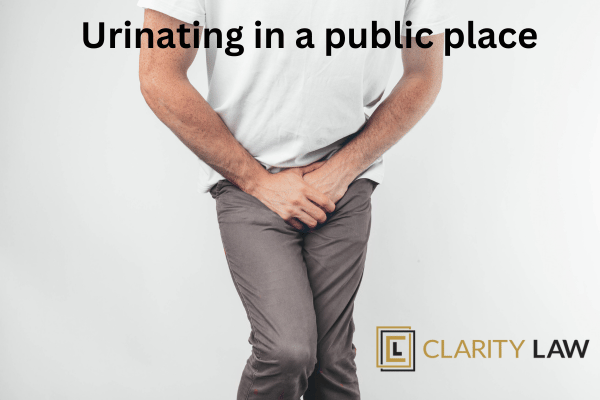
It is unsurprisingly that it is an offence in Queensland to urinate in a public place, it is an offence that is broadly considered that interferes with the publics peaceful and lawful use of a public place. It is gnerally considered to be a type of public nuisance offence.
The police can issue an infringent notice for this offence or summon a person to court to face a public urination charge.
There is considerable debate whether the charge of public urination should be removed.
What exactly does the law say about this offence?
Urinating in a public place is an offence under against section 7 of the Summary Offences Act 2005 under Queensland criminal law.
The law states that A person must not urinate in a public place.
Maximum penalty—
- if the person urinates within licensed premises, or in the vicinity of licensed premises—4 penalty units; or
- otherwise—2 penalty units.
- In a proceeding for an offence against subsection (1), evidence that liquid was seen to be discharged from the vicinity of a person’s pelvic area is enough evidence that the person was urinating.
- In this section— public place does not include a facility in a public place that is designed for use as a toilet.
What do the Prosecution have to prove?
This is an offence which is extremely clear, and has quite basic fault elements.
The Police have to prove:
-
The defendant;
-
Urinated (or at least, liquid was observed to be seen being discharged from a person pelvic area); and
-
That they did so in a public place, noting that this includes a place which is open to the public whether or not on payment of a fee.
A person committs the offence if those elements can be proven.
What does this offence look like in practice?
It is quite plain, this offence usually eventuates in the vicinity of a licenced premises, for the obvious reasons.
This offence could eventuate when a person in a public park or hiking trail, unable to locate a toilet decides to urinate against a tree or bush.
What about my rear left tire?
There has persisted, a myth that in the absence of a publicly available toilet, that a person can urinate on the rear left tire of their vehicle. Let it be absolutely plain – this is a legal fiction, this law or exemption does not exist.
What is the likely outcome for this type of offence?
Section 7 of the Summary Offences Act outlines that this offence is only punishable by a fine. If the offence occurs within or in the vicinity of a licenced premises then 4 penalty units (at the date of publication being $619.20) otherwise 2 penalty units (at the date of publication being $309.60) – noting that penalty units increased each year on 1 July.
This matter, depending on the age, character and circumstances of the offender, could be dealt with by the imposition of a recognisance upon entering into a good behaviour bond.
What court will hear my matter?
This matter must be dealt with in the Magistrates Court jurisdiction where the offence occurred. It is possible, if necessary to have this matter transferred to a different jurisdiction, however it is not a guarantee that this will occur.
Are there any defences?
The simple answer is yes. There are a number of defences that are available, including but not limited to:
-
The alleged act was not in or near a public place;
-
The defendant did not urinate;
-
The defendant was in fact not the person whom is alleged to have committed the act (identification issue).
It would not gnerally be a reasonable excuse to say you had no other options on where to urinate unless you had a medical condition.
Why should I choose you and not just represent myself?
Just some reasons include;
-
we know the Magistrates and what they want to hear to give you the best outcome for a wilful exposure charge
-
we have good relationships with the police prosecutors meaning we can often have them agree to the sentence we are asking the court to impose
-
we are there to help you through the process and make everything as stress free as possible, in most cases you will not have to say anything in court
-
engaging us shows the court you are taking your charges seriously
-
your matter will be heard early, often first, you do not have to wait for 20-30 other matters to be heard before you
-
you will be fully informed of what is to happen in court and what this means for you after court
-
unlike the police or the magistrate, we are there to look after you, your privacy and your interests
Our experienced solicitors understand the sensitivity and potential embarrassment this charge may have on someone, any conversation had with our office is strictly confidential, with as few eyes on your file as necessary.
Conclusion
This article is by no means an exhaustive guide to this offence, but stands as a handy ready reckoner for someone looking for more information on or being charged with the offence. If you are charged with the offence, please contact our office for a free initial consultation.
How do I get more information or engage Clarity Law to act for me?
If you want to engage us or just need further information or advice then you can either;
-
Use our contact form and we will contact you by email or phone at a time that suits you
-
Book a time for us to call you
-
Call us on 1300 952 255 seven days a week, 7am to 7pm
-
Email This email address is being protected from spambots. You need JavaScript enabled to view it.






